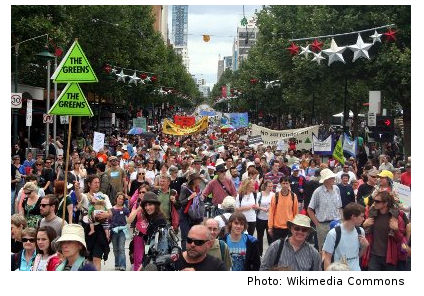|
Objectives/Tasks/Methods
The main research question that underpins this project is the
following: What meanings do citizens associate with political
participation and how can communication practices enhance or hamper
citizen engagement with socio-political issues?
Political participation normally refers to top-down processes: it takes
place insofar as official institutions decide to open spaces for such
participation and in the shape that is chosen by such institutions (the
dominant type in Portugal being public consultation).
 There
are also of course forms of political participation and
engagement that are bottom-up, initiated and run by members of the
so-called ‘civil society’. There
are also of course forms of political participation and
engagement that are bottom-up, initiated and run by members of the
so-called ‘civil society’.
These include multiple forms of social
mobilization and protest such as demonstrations, media campaigns and
direct action, as well as different forms of participation in new and
old media, and may involve non-governmental organizations, looser
social movements and individual citizens.
COMPOLIS focuses both on top-down and on some bottom-up forms of
political participation. Here, ‘the political’ is not
limited to institutionalized politics or government but includes
different forms of (discursive) action on collective problems taking
place in public spaces.
COMPOLIS will evolve in a stepwise manner and involve multiple methods.
It consists of three main parts that correspond to the tasks described
below.
In task 1, through the analysis of formal and informal public
participation in key political processes on environmental issues, the
analysis of official documents and of media coverage, we will map and
characterize different types of political participation that have taken
place in Portugal and draw connections to diverse communication
practices.
 The second task will look at political subjectivities, that is,
citizens’ sense of their political self and of spaces for
participation. Questionnaires, interviews and focus groups data will be
triangulated to build a comprehensive picture of people’s sense of
political engagement and of the discourses that may shape it.
The second task will look at political subjectivities, that is,
citizens’ sense of their political self and of spaces for
participation. Questionnaires, interviews and focus groups data will be
triangulated to build a comprehensive picture of people’s sense of
political engagement and of the discourses that may shape it.
The third part of the project will consist in the analysis of political
engagement amongst members of the Transition movement.
This
international movement aims to enable communities to deal with the dual
challenges of climate change and peak oil by decreasing the use of
fossil fuels and building ecological resilience. With
Transition, ‘Energy Descent Action Plans’ are jointly designed and
implemented by local citizens, local agencies and city councils.
The concept of transition refers to preparation for an uncertain future
marked by environmental problems and resource depletion and has gained
a wider application.
Expected
Results
The COMPOLIS results
will include:
- characterization of types of discourses that may promote or deter
citizens from engaging with political processes
- comparison of political engagement through traditional spaces created
by political institutions with political engagement in more bottom-up
initiatives
- insight on the means and types of communication to be developed by
official institutions and civic groups in order to garner interest,
generate mobilization and promote actual political participation.
The research carried out in the context of this project will be
disseminated through national and international conference papers and a
set of national and international journal articles.
In addition, the findings of COMPOLIS will be ‘translated’ into more
practical advice with recommendations geared
to official bodies involved in promoting public participation, as well
as to civic groups.
|

